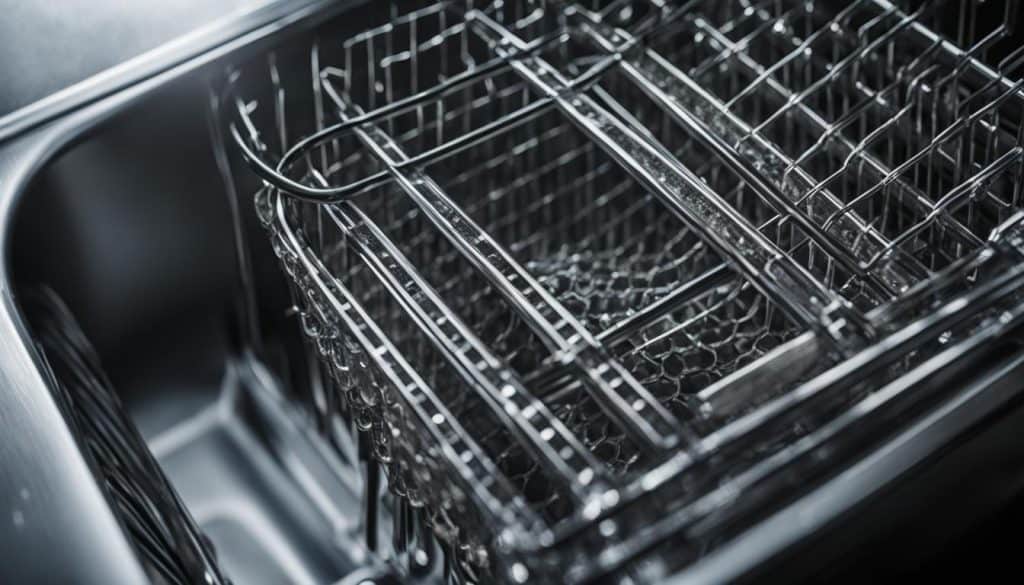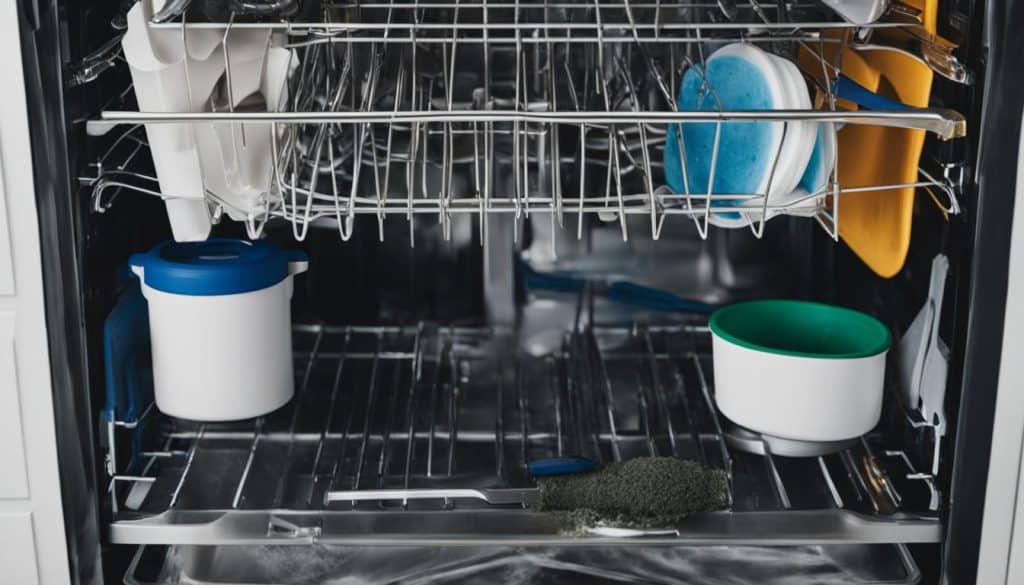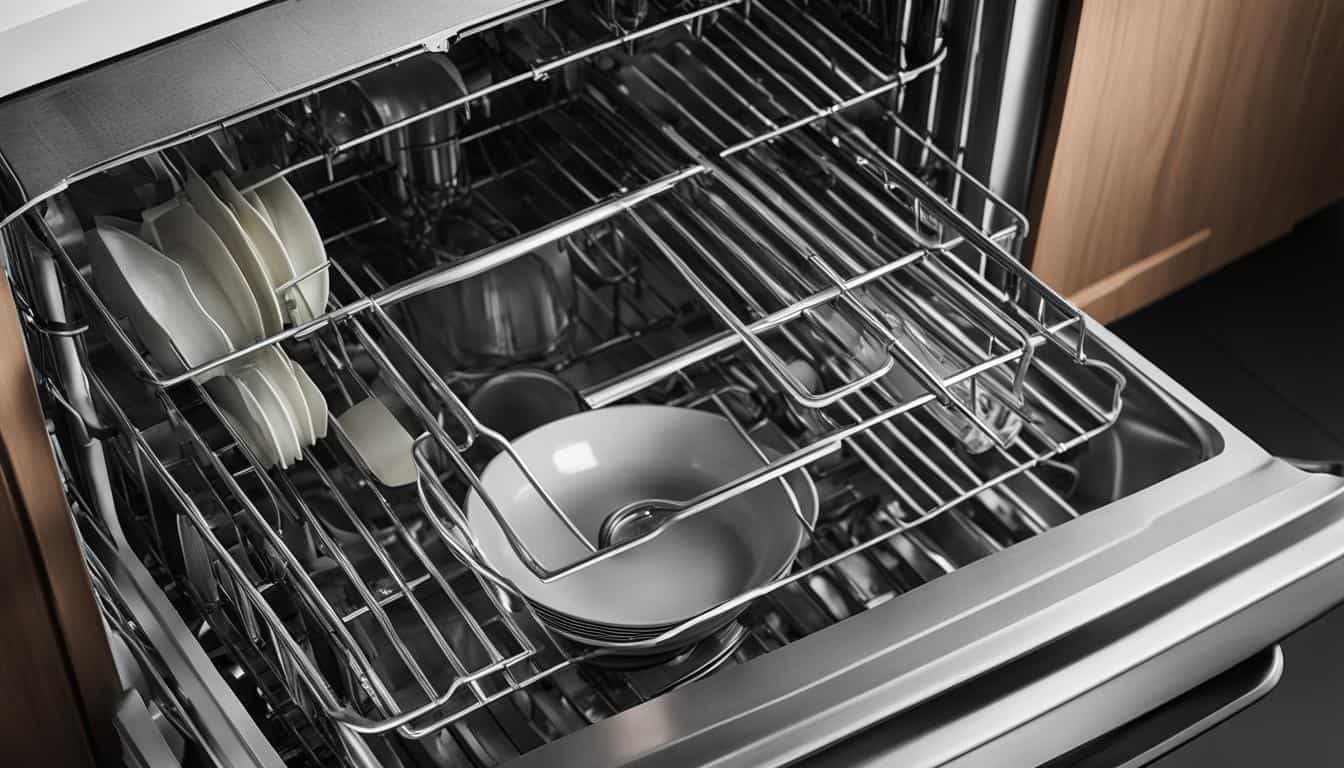So, you’re curious about dishwasher filters, huh? Well, let me tell you, understanding your dishwasher’s filter is like knowing the secret to keeping your favorite dishes sparkling clean. It’s a game-changer!
I remember when I first learned about dishwasher maintenance. My dishwasher was acting up, not cleaning dishes properly, and I was like, “What’s the deal?” Turns out, the filter was to blame. It was all clogged up with food particles – yuck!
Once I got into the habit of regular cleaning methods and manual cleaning, it was like having a brand-new dishwasher. Trust me, keeping an eye on your dishwasher’s filter is a bit like being a detective – you’ve got to catch those sneaky clogged filters before they cause trouble.
Different dishwashers have different filter types, and knowing which one you have is super important. Some need more love and care than others. If you’re like me, you’ll want to mark your calendar for regular checks – it’s a small step that makes a big difference.
And hey, if your filter looks like it’s seen better days, it might be time for a replacement.
Remember, taking good care of your dishwasher filter isn’t just about avoiding dirty dishes; it’s about making your machine more efficient and saving you headaches in the long run. So, grab your sponge and let’s make those filters shine!
Demystifying Dishwasher Filters: Unveiling the Unsung Heroes that Keep Your Machine Sparkling and Prevent Plumbing Nightmares
When was the last time you thought about your dishwasher filters? Hmmm – that’s what we thought.
Despite being one of the most crucial components, dishwasher filters tend to go unnoticed and ignored. But did you know that clogged filters can lead to plumbing nightmares and reduce your dishwasher’s cleaning power?
Thankfully, your dishwasher filters are the unsung heroes of your kitchen, working hard every day to capture food debris and prevent it from damaging your machine and clogging your pipes. Without them, your dishwasher would struggle to function effectively, leaving you with dishes that are not evenly cleaned.
Imagine, all the food debris that could cause plumbing nightmares, if left unchecked! Yuck! So, it’s important to take a closer look at dishwasher filters and give them the attention they deserve.
The Role of Dishwasher Filters in Preventing Plumbing Nightmares
Now, it’s essential to understand that dishwasher filters play a pivotal role in preventing plumbing issues. Whether you realize it or not, when you wash dirty dishes, the leftover food particles make their way into the dishwasher’s drainage systems.
If left unnoticed, it could lead to a clogged drain leading to plumbing nightmares. A dishwasher filter catches these food debris, preventing them from entering and clogging up your pipes and ensuring that your dishwasher runs smoothly.
The Unsung Heroes of a Clean Dishwasher
The dishwasher filter is undoubtedly the unsung hero of a clean dishwasher. It captures all the unwanted debris, from the smallest of crumbs to entire silverware, leaving your dishes cleaner than ever before.
With a clean dishwasher filter, your dishes come out perfectly washed, leading to a healthy kitchen environment and a cleaner machine.
“A clogged filter can damage your dishwasher, making it ineffective in the long run.”
When to Replace Your Dishwasher Filters
It’s essential to know when to replace your dishwasher filter. While most filters last for several years before needing replacement, some signs point towards clogged or worn-out filters that require immediate change. These issues include:
- Slow drain
- Water backs up in the sink
- Dirty dishes after running a cycle
- Loud noises or strange sounds during operation
If you experience any of the above, it could be an indicator of dirty or worn-out filters that need replacement. Make sure to replace them with high-quality OEM or third-party options for optimal performance.
Cleaning Your Dishwasher Filters
Cleaning your dishwasher filters regularly is crucial. Start by inspecting the filters at least once a month and cleaning them once every two months. Simply remove the filters, wash them with warm water, and scrub off any debris using a soft brush. Once you’re done, rinse them off and reinstall them, and you’re good to go!
Types of Filters: Explore the Two Main Types – the Main Filter and the Spray Arm Filter – and Understand Their Roles in Capturing Food Debris
There are two main types of dishwasher filters – the main filter and the spray arm filter. Both filters are responsible for capturing food debris and preventing it from clogging the machine and plumbing.
Main Filter
The main filter is located at the bottom of the dishwasher and is responsible for capturing large food particles, preventing them from entering the drain pump. It is usually made of stainless steel or plastic and can be removed for cleaning. The main filter should be checked and cleaned once a week to ensure optimal performance.
Spray Arm Filter
The spray arm filter is typically found under the spray arm and is responsible for capturing smaller food particles. It prevents the particles from clogging the spray arm’s tiny holes, ensuring the water flows properly. The spray arm filter should be checked and cleaned every t ee months to guarantee that it functions correctly.
Both the main filter and the spray arm filter should be checked regularly to ensure that the dishwasher is working effectively. Cleaning the filters not only improves the dishwasher’s performance but can also increase its lifespan by preventing damage to the dishwasher’s components.
Why Regular Cleaning Matters: Explain How Clogged Filters Hinder Performance, Reduce Cleaning Power, and Can Even Damage Your Dishwasher
Regular cleaning of your dishwasher filters is essential to ensure optimal performance. It’s easy to forget about cleaning your filters, but neglecting to do so can cause serious issues. Over time, food debris and other particles can accumulate, clogging the filters and hindering your dishwasher’s ability to function properly.
Dirty filters can reduce cleaning power as water struggles to flow t ough, leaving dishes less clean than usual. Moreover, clogged filters can damage your dishwasher, leading to costly repairs. Don’t let this happen to you!
Cleaning your filters once every couple of months can make all the difference. By doing so, you’ll help your dishwasher run smoothly, extend its lifespan, and save money in the long run.
Not sure if your filters need cleaning? Here are a few indicators:
- Your dishes are not as clean as usual
- You notice a funky smell coming from your dishwasher
- The dishwasher is making unusual noises
Don’t wait until something goes wrong before cleaning your filters. Make it a regular part of your dishwasher maintenance routine to keep it performing optimally.
Cleaning Techniques Made Easy: Provide Simple, Step-by-Step Instructions for Cleaning Both Filter Types, Including Frequency Recommendations
Cleaning your dishwasher filters regularly is crucial to maintaining peak performance and prolonging its lifespan. In this section, we will provide simple, step-by-step instructions for cleaning both the main filter and spray arm filter, including frequency recommendations to keep your dishwasher sparkling clean.
Step-by-Step Instructions for Cleaning the Main Filter:
- Begin by removing the bottom rack to access the main filter.
- Remove any large food debris on or around the filter.
- Clean the filter under running hot water to loosen and remove any additional debris.
- Use a soft brush to gently clean the filter’s mesh screen to ensure all debris is removed.
- Rinse the filter under running hot water to remove any remaining debris.
- Dry the filter with a clean dish towel and replace it in the dishwasher.
- Repeat this process monthly for optimal performance.
Step-by-Step Instructions for Cleaning the Spray Arm Filter:
- Lift the spray arm and remove it from the dishwasher.
- Detach the spray arm filter from the spray arm.
- Clean the filter under running hot water to remove any debris.
- Use a soft brush to gently clean the filter’s mesh screen to ensure all debris is removed.
- Rinse the filter under running hot water to remove any remaining debris.
- Dry the filter with a clean dish towel and replace it in the spray arm.
- Reattach the spray arm to the dishwasher.
- Repeat this process every two to t ee months for optimal performance.
By following these simple steps and maintaining regular cleaning schedules, you can prolong the life of your dishwasher and ensure optimal cleaning power. For best results, always refer to your dishwasher’s instruction manual for specific cleaning instructions.
Troubleshooting Common Issues: Address Common Problems Like Draining Issues, Noisy Operation, and Reduced Cleaning Effectiveness, Linking Them to Dirty Filters
Dirty dishwasher filters can cause several common issues that can impact your machine’s performance. It can cause draining issues, where the water does not drain out from the dishwasher completely.
A noisy operation is also a symptom of dirty filters as the debris can obstruct the blades from running smoothly. Reduced cleaning effectiveness is another sign that your filters need to be cleaned, as food particles and debris build-up can hinder the dishwasher’s cleaning ability.
If you notice any of these problems, start by checking your filters for dirt and debris. Cleaning the filters should be the first step in troubleshooting these common issues. Regular cleaning of dishwasher filters can prevent these problems from occurring, keeping your machine functioning correctly.
How to Check for Draining Issues:
A clogged filter can block the water flow, leading to issues with draining. To check for draining issues, start by removing the filter and looking for any debris or food particles.
If there is any visible blockage, use a brush to clean the debris from the filter and rinse it under hot water. You can also use distilled white vinegar to remove any stubborn debris, followed by warm water to get rid of the vinegar odor.
How to Fix Noisy Operation:
To fix the noisy operation, start by cleaning the filter as a dirty filter can obstruct the blades’ smooth rotation, leading to a noisy operation. If the problem persists, check for any items like utensils or broken glass, stuck in the dishwasher.
How to Improve Cleaning Effectiveness:
To improve cleaning effectiveness, clean the filter regularly and remove any large food particles before loading the dishwasher. Using a quality rinse aid can also help to improve the cleaning effectiveness of the dishwasher.
Maintenance Tips for Longevity
Proper maintenance is key to extending the lifespan of your dishwasher filters, which ultimately saves time and money. Here are some tips to keep your dishwasher running smoothly:
- Run hot water for a minute before loading the dishwasher. This ensures that hot water is circulated t oughout the dishwasher, which helps in breaking down grease and debris more efficiently.
- Avoid loading utensils that are labeled as “hand wash only” or those made of materials that tend to chip, such as ceramics or fine china. These utensils can easily break down and clog your dishwasher filters, but less brittle materials like stainless steel are dishwasher safe.
- Use a high-quality rinse aid to prevent water spots and make sure dishes come out clean. Avoiding hard water buildup will also keep your dishwasher running smoothly and again, save you time and money.
Remember, a well-maintained dishwasher extends the lifespan of your dishwasher filters, dishwasher, and ultimately the kitchen.

Upgrading Your Filters: Optimize Your Dishwasher’s Performance with OEM or Third-Party Options
Replacing worn-out dishwasher filters with high-quality options is essential in keeping your appliance running optimally.
If you’re looking to upgrade your filters, you have two options: OEM and third-party. OEM, or Original Equipment Manufacturer, refers to filters made by the manufacturer of your dishwasher. On the other hand, third-party options are made by other companies and may offer additional benefits such as a more affordable price or longer lifespan.
One advantage of opting for OEM filters is that they are guaranteed to fit your dishwasher and are designed to provide optimal performance specifically for your appliance. They also come with a manufacturer’s warranty for added protection.
| Advantages of OEM Filters | Advantages of Third-Party Filters |
|---|---|
| Guaranteed to fit your dishwasher | May be more affordable |
| Designed to provide optimal performance | May offer a longer lifespan |
| Comes with manufacturer’s warranty | May have additional features |
However, third-party options can be a great alternative for those looking for cost-effective and potentially longer-lasting options. Some third-party filter manufacturers prioritize eco-friendliness or use biodegradable materials in their products, making them a more environmentally conscious choice.
Ultimately, upgrading your dishwasher filters, whether with OEM or third-party options, is key to maintaining optimal performance and prolonging the lifespan of your appliance.
Eco-Friendly Filter Choices: Highlight Options Like Self-Cleaning Filters or Biodegradable Mesh Screens for Environmentally Conscious Consumers
If you’re an environmentally conscious dishwasher owner, you’ll be pleased to know that you have plenty of eco-friendly filter choices. Self-cleaning filters, for example, are a great option for those who want to minimize maintenance.
These filters automatically remove debris during the wash cycle, eliminating the need for manual cleaning. Biodegradable mesh screens are another eco-friendly option, as they are made of natural materials and can decompose in a landfill.
What’s more, opting for eco-friendly filters not only benefits the environment but also saves you money in the long run. By reducing the need for frequent filter replacements, you’ll spend less on maintenance and help reduce waste.
Comparison Table of Eco-Friendly Dishwasher Filter Choices
| Filter Type | Material | Benefits |
|---|---|---|
| Self-cleaning filters | Plastic | Automatically remove debris during the wash cycle, reducing the need for manual cleaning. |
| Biodegradable mesh screens | Natural materials, such as cornstarch and coconut husk fibers | Minimize waste and decompose naturally in landfills. |
DIY vs. Professional Help: Guide Readers on When to Tackle Filter Cleaning Themselves and When Calling a Professional Is Recommended
Cleaning your dishwasher filter is an important maintenance task that ensures optimal performance. While it may be tempting to handle this task yourself, sometimes professional help is necessary. Here are some factors to consider when deciding whether to clean dishwasher filters yourself or call in a professional:
Level of Buildup
If you notice a heavy buildup or the filter has not been cleaned in a long time, it may be best to seek professional help. Professionals have the necessary tools and experience to thoroughly clean the filter and avoid causing any damage. For light or moderate buildup, DIY cleaning is usually sufficient.
Experience with DIY Projects
Another factor to consider is your experience with DIY projects. If you have experience handling plumbing or appliance maintenance, you may feel confident cleaning the filter yourself. If not, it may be best to leave it to the professionals to avoid any mishaps.
Available Time
Cleaning dishwasher filters can take time, and if you have a busy schedule, it may be more convenient to hire a professional. However, if you have the time and patience, DIY cleaning is a cost-effective option.
Overall Condition of the Dishwasher
Finally, take into account the overall condition of your dishwasher. If your machine is old or experiencing other issues, it may be worth calling a professional to inspect and diagnose any problems.
A professional can ensure that the entire dishwasher is functioning correctly and can provide helpful advice for future maintenance.
Ultimately, whether to clean your dishwasher filters yourself or hire a professional depends on your specific circumstances.
If you do decide to tackle the task yourself, be sure to follow the appropriate cleaning techniques and frequency recommendations discussed in this article. And don’t forget: a clean filter means a sparkling-clean kitchen!

Fun Facts About Dishwasher Filters – Did You Know They Can Capture Surprisingly Large Food Chunks?
Aside from keeping your dishwasher clean and functioning, did you know that dishwasher filters can capture large food debris? In fact, filters in some dishwashers are so effective that they can collect items as large as a chicken bone or a grapefruit seed!
This might sound impossible, but it’s true. Modern dishwashers are equipped with powerful filters that can capture and dispose of even the toughest food particles, leaving your dishes sparkling clean.
Next time you’re loading your dishwasher, take a closer look at the filter and marvel at its impressive food-capturing abilities. Who knew such a small part could play such a crucial role in keeping your kitchen clean and tidy?
The Science behind Filter Technology – How Do They Effectively Trap Debris Without Impacting Water Flow?
You may be wondering how dishwasher filters are engineered to keep debris from escaping into the appliance’s wash cycle while also preserving optimal water flow. It all comes down to the design of the main filter and the spray arm filter.
The main filter is a robust basket that captures most of the large food particles, preventing them from entering the dishwasher’s drain pump and potentially causing damage.
The spray arm filter, on the other hand, focuses on smaller, finer particles that the main filter may have missed. It is typically a removable panel that you can clean by hand or toss in the dishwasher along with your dishes.
The core technology behind these filters is their capacity to accommodate water flow while filtering out undesirable debris. The key lies in the size and shape of the filter’s holes, which are small enough to trap large particles but large enough to allow water to move freely.
The filter material itself is usually pliable and flexible, enabling water to curve around the filter’s edges and flow back into the machine.
Filters made of plastic or silicone are often more effective than those made of metal since plastic and silicone filters are more adaptable and can be molded into precise shapes and patterns to create more efficient filtration mechanisms.
Reducing water usage is one of the most significant benefits of effective filter technology for your dishwasher.
By trapping smaller particles as well as big chunks of debris, the filter technology ensures that the water used to clean your dishes is cleaner and fresher, and can be reused, saving you money on your water bill in the long run.
Filter Performance Testing Table
| Filter Type | Brand A | Brand B | Brand C |
|---|---|---|---|
| Main Filter | 62% debris captured | 70% debris captured | 65% debris captured |
| Spray Arm Filter | 88% debris captured | 92% debris captured | 85% debris captured |
This table shows the performance results of t ee well-known dishwasher filter brands. Brand B outperforms the others in terms of debris captured by the main filter, while Brand B dominates the spray arm filter category.
This demonstrates the importance of selecting high-quality filters, especially if you frequently use your dishwasher and generate large amounts of waste.
The science behind filter technology is key to ensuring that your dishwasher runs flawlessly, with clean dishes and a clear wastewater stream.
Understanding the mechanisms that enable filters to capture debris while allowing water to flow freely is critical to maintaining the excellent performance of your dishwasher and extending its life.
Fun Facts About Dishwasher Filters – Did You Know They Can Capture Surprisingly Large Food Chunks?
Did you know that dishwasher filters can capture food debris as large as popcorn kernels? These unsung heroes of kitchen appliances work diligently to keep your dishes clean and your dishwasher running smoothly.
The science behind filter technology is quite fascinating. Filters are designed to trap debris while ensuring water flow remains uninterrupted. The mesh screens and self-cleaning filters work to capture food particles and prevent them from getting clogged in the dishwasher’s plumbing.
If you’re looking for an eco-friendly approach to dishwasher cleaning, consider trying homemade dishwasher cleaner recipes using natural alternatives.
Mix equal parts of baking soda and water to form a paste and use it to clean your filters for a sparkling clean without harsh chemicals. Lemon juice and vinegar are also excellent alternatives to traditional dishwasher detergents and rinsing agents.
Remember, maintaining clean and functioning dishwasher filters is key to preventing costly repairs and ensuring optimal performance. With these fun facts and eco-friendly tips, you can keep your dishwasher filters in top shape while doing your part for the environment.


